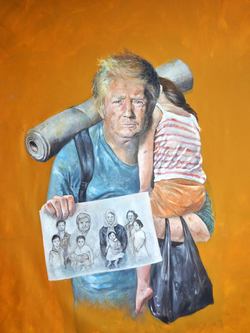|
Can we ever get back to "for the people"?  Image copyright Abdalla Omari Image copyright Abdalla Omari “I feel your pain.” How many times have you heard that phrase uttered by people who have absolutely no clue what you're going through because they have never walked a mile in your shoes. These people mean well, but unless they’ve been where you have – whether that's poverty, divorce, loss of a child, homelessness, despair – they can’t possibly know. Some of the new policies and laws being proposed in Washington right now will hurt the most vulnerable people in this country, and the people pushing these changes them don’t seem to care. Why? For a minute, let’s assume that our lawmakers and elected officials are not evil people (come on, try…) If that’s the case, then how can they take actions will deliver devastating effects to millions? Are they cold-hearted misanthropes or is there some basic human component that they lack? I think it’s this: Empathy. Perhaps you’ve seen the paintings of Syrian artist Abdalla Omari floating around the internet that depict world leaders as beggars who are homeless and vulnerable. The idea is at once ludicrous and provocative. Vladimir Putin begging for rubles? Donald Trump sleeping under a bridge? If our Commander in Chief had to live in extreme poverty for even one week, would he be more likely to care about the people he’s about to destroy? I say the answer is yes and here’s why: Several years ago I participated in a poverty simulation courtesy of Leadership Charlotte and Crisis Assistance Ministry. In a simulation such as this, you are given an identity, a situation and a scenario. For example, my identity was wife to a man, and mother to two children. The situation was that our daughter was pregnant at 16. We were not terribly bad off, but our scenario was that we spent most of what we earned just keeping a roof over our heads and gas in our cars. Then one of our cars broke down, husband lost his job, and pregnant daughter got expelled from school. Things began to spiral downward, and soon we were on the verge of losing our home. In real life, I was a CEO at the time, but even bringing all my real world experience to this problem, the forces of poverty were too great. We lost our house, our car, and my job. We became homeless. Now, after that simulation – which theoretically spanned a month but took place in an afternoon – I never thought about poverty and homelessness the same way again. It had such a profound effect on me, perhaps because I realized how close many people are to that precipice, and once you get hurtled over it, it’s almost impossible to claw your way back up. But before the simulation, I thought about poverty and homelessness the way many people do – somehow it’s the person’s fault, or they’re lazy, or they don’t want to work, or they’re not trying hard enough. In all cases, I was wrong. Why not make it mandatory for every elected politician and lawmaker to experience a poverty simulation? Why not make it compulsory for presidential candidates to actually live for a week in the poorest communities in the US? Only the most hard-hearted, incalculably cold person would not be affected and moved by the experience. Personal experience with some issue almost always drives commitment. Think of Senator Creigh Deeds whose bright and promising son attacked him with a knife while gripped by a schizophrenic delusion, then shot himself. Deeds, who had been using every effort and influence to get his son proper mental health intervention, experienced’ the most tragic outcome imaginable, and because of that, is an outspoken advocate for improving the mental health care system in this country. Christopher Reeve, rendered a paraplegic after a horseback riding accident, became an evangelist for spinal cord research. And closer to home, Shaaron Funderburk, a former prostitute and drug addict, founded a program that helps women in her former situation get clean, sober and employed in traditional jobs. Personal experience with a problem inspires commitment to finding a solution. Let’s suggest (or insist) our elected people experience what the worst-off in this country have to face every day. I know this is very “Canadian” type thinking (which I come by honestly, of course) but I believe it would help drive more humane policies. At the very least, every American who wants to be a better local and global neighbor should sign up for a poverty simulation. It will make you two things: more aware and empathetic, and incredibly, deeply grateful for what you have. Feeling someone’s pain, however briefly, will open your eyes…and your heart. And we need more of that now more than ever. What about you? Any (legal and sane) ideas for bringing humanity back to our government?
2 Comments
|
AuthorI've never been accused of not having an opinion. Even if you don't agree, hopefully you will enjoy! Archives
April 2020
Categories |


 RSS Feed
RSS Feed